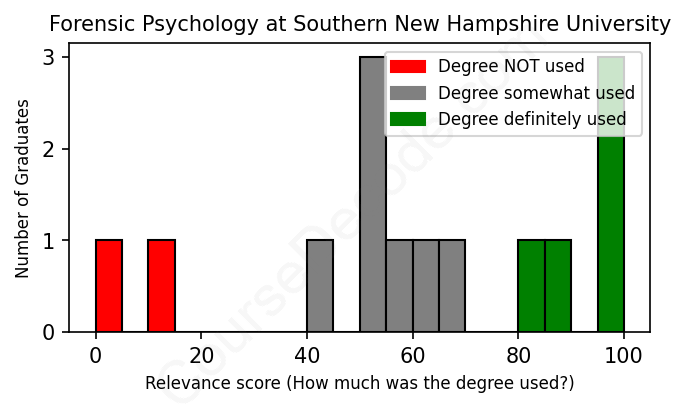
First, some facts. Of the Forensic Psychology graduates from Southern New Hampshire University we've analyzed , here's how many have used (or NOT used) their degree in their career:

These are estimates based on AI analysis of 14 LinkedIn profiles (see below).
The verdict? Below average. Overall, with an average relevance score of 61%, Forensic Psychology graduates from Southern New Hampshire University have a lower likelihood (-6%) of finding work in this field compared to the average graduate across all fields:
And for comparison, here's the chart for all profiles we've looked at across all degrees.
Also, after graduating, 35% of these graduates have pursued further education other than another Bachelor's degree (such as a Masters degree or other), which is right in line with the average across all fields.
See the details:
|
Relevance score: 3% We think this person has NOT gone into a career related to their degree. We think this person has NOT gone into a career related to their degree.
DEGREE INFOGraduated in 2015 from Southern New Hampshire University with a Bachelor of Arts - BA in Forensic Psychology. No other secondary education since. JOB HISTORY SINCE GRADUATIONCosmetics Manager HEB May 2017 - Present Finance Manager  GFI Global Financial Impact Feb 2024 - Present ABOUTEmbarking on a new journey in the world of finance. I love being able to help families learn and better protect themselves for what may come in the future. At Global Financial Impact, we have a wide array of products but our biggest product is education! Previously, I have worked at HEB for 13 years. I run a successful department, trainer for partners perusing a managerial role, and a mentor. I took a military leave of absence to serve my country for 5 years. I gained knowledge and real world experience that I still use in my everyday life. I hold a MS in Forensic Psychology with hopes to get hands on or an internship to gain more experience. |
The top 10 most common jobs done by the graduates we've analyzed (ranked most common to least) are:
After looking through the job profiles of graduates from Southern New Hampshire University's Forensic Psychology program, it seems like a wide variety of fields have been explored. A big chunk of the roles, like Clinical Internships at treatment programs and correctional centers, have strong ties to forensic psychology because they directly involve applying psychological concepts in clinical settings. Roles like Victim Witness Advocate and Family Service Specialist also stand out as highly relevant because they support individuals navigating the legal or social services systems. These positions often require understanding emotional and psychological aspects of clients, which is central to forensic psychology.
On the flip side, many graduates ended up in roles that don't really relate to forensic psychology at all, such as Service Manager, Cosmetics Manager, and even as a Barber. These jobs mostly focus on areas like retail, finance, or administrative tasks that don’t leverage the specialized knowledge from their degree. Overall, while there are definitely graduates doing impactful work tied closely to forensic psychology, there are also several who ventured into less relevant territories. It highlights that while having a degree in forensic psychology can open some doors, it doesn't always guarantee a career directly in that field.
Here is a visual representation of the most common words in job titles for Forensic Psychology graduates (this is across all Forensic Psychology graduates we've analyzed, not just those who went to Southern New Hampshire University):

Looking at the career paths of graduates from the Forensic Psychology program at Southern New Hampshire University, it seems like there’s a mixed bag of outcomes. Many graduates start off in positions related to mental health support and advocacy after graduation, such as internships in clinical settings or roles like case managers and support staff. For example, some grads took on roles like mental health professionals and victim advocates right after school, which aligns directly with what you'd expect from a forensic psychology background. Over the first few years, it looks like a decent number of graduates are staying in the field, with some advancing into more specialized positions, like Behavior Health Navigators or CQI Program Managers. That’s a positive sign that the initial jobs are leading to growth in relevant areas.
However, as we look further down the line, say five to ten years later, the picture starts to blur a bit. Some grads have shifted out of the traditional forensic psychology realm into unrelated fields, such as finance and cosmetics management. There’s also a notable number who seem to cycle through roles or land in jobs that don’t fully utilize their forensic psychology training, like barbers or auto service managers. So while it’s clear that a lot of graduates initially stick with careers in mental health and advocacy, it appears that some eventually drift into other industries or positions that don't closely connect to their degree. It definitely highlights that while the degree can open doors to meaningful careers, maintaining a direct line to forensic psychology isn’t guaranteed for everyone.
Honestly, a Bachelor’s degree in Forensic Psychology can be a bit of a mixed bag when it comes to difficulty. At Southern New Hampshire University, the program is designed to be accessible, especially since it's geared towards online learning. That means you can pace yourself, which helps a lot. The courses can be challenging, especially when it comes to understanding complex concepts in psychology and the law, but if you've got a genuine interest in the subject and are willing to put in the effort, it's definitely manageable. Overall, I’d say it’s about average in terms of difficulty; you’ll need to stay organized and keep up with the readings and assignments, but it's not like you're going to be drowning in work every week.
Most commonly, in the LinkedIn profiles we've looked at, it takes people 2 years to finish a Bachelor degree in Forensic Psychology.
Looking at the jobs these Forensic Psychology grads from Southern New Hampshire University have held, it's kind of a mixed bag when it comes to money. Some of them have landed roles that seem promising, like being a Policy Consultant or a CQI Program Manager, which usually suggests a decent paycheck. However, many other positions, like mental health professionals or support roles, often don’t pay as well, especially starting out. A few folks have even jumped into management roles or specialized positions that can be lucrative over time, which is great to see. Overall, while some are likely doing reasonably well financially, others might be struggling a bit more, especially in the entry-level jobs. It's definitely a journey, with income leveling up in different ways depending on their paths!
Here is a visual representation of the most common words seen in the "about" section of LinkedIn profiles who have a Bachelor degree in Forensic Psychology (this is across all Forensic Psychology graduates we've analyzed, not just those who went to Southern New Hampshire University). This may or may not be useful:

Here are all colleges offering a Bachelor degree in Forensic Psychology (ordered by the average relevance score of their Forensic Psychology graduates, best to worst) where we have analyzed at least 10 of their graduates:
| College | Score | Count |
|---|---|---|
 Southern New Hampshire University Southern New Hampshire University
|
61 | 14 |
 John Jay College (CUNY) John Jay College (CUNY)
|
51 | 53 |
 City University of New York-John Jay College of Criminal Justice City University of New York-John Jay College of Criminal Justice
|
43 | 13 |